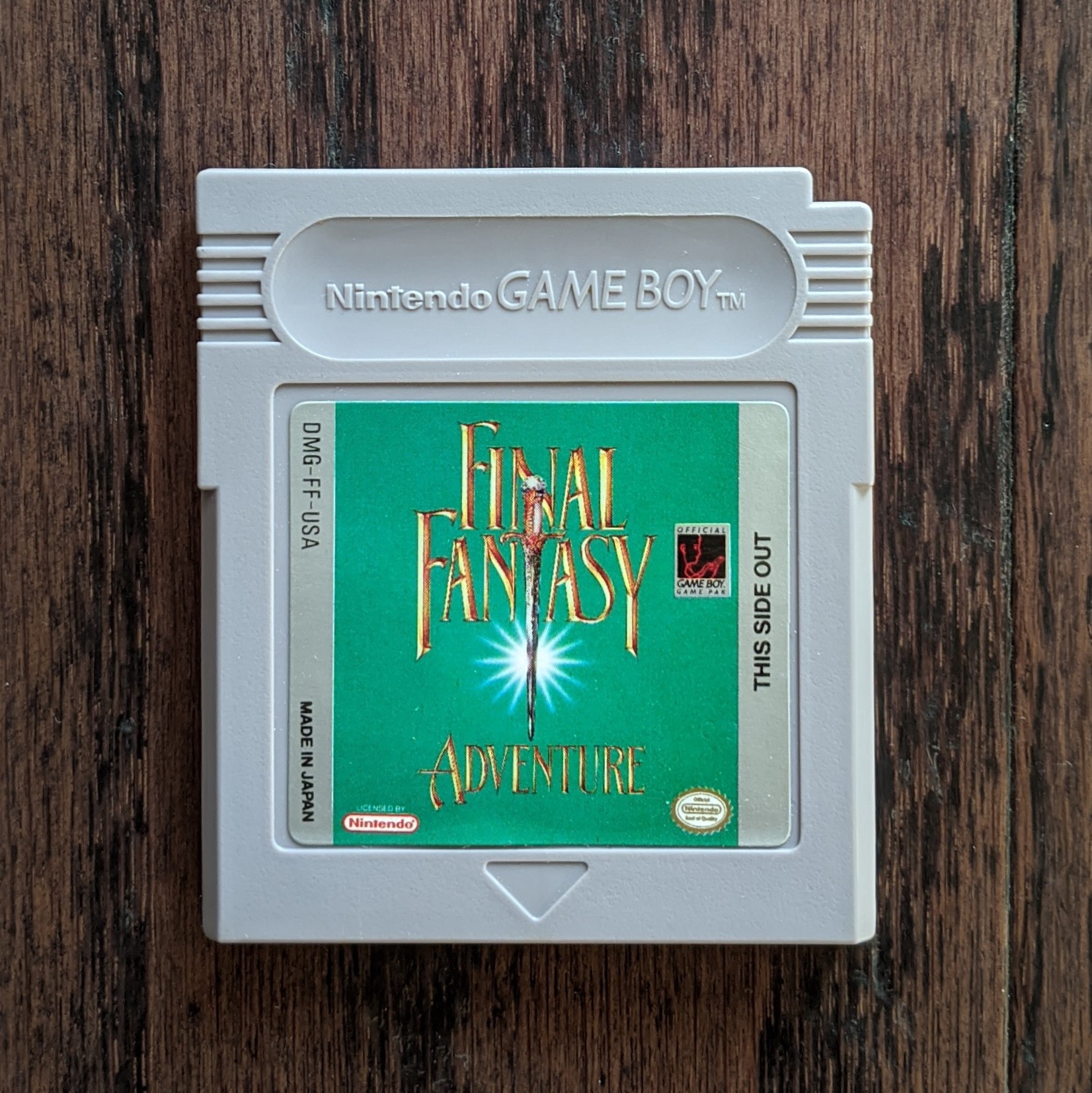
One moment in gaming from my childhood I’ll never forget is a certain trip I took on my birthday to EB games. Looking through the store for a new game, I noticed this bright green box on the bottom shelf that called out to me. I picked up the box , reading the title Final Fantasy Adventure, and something inside me just knew I had to play this game. So, I picked it as my birthday gift for that year and it was a decision I didn’t regret. Over the course of my childhood I played this game a lot, getting stuck at certain puzzles for long stretches of time, and eventually beating the game sometime in my teen years. Obviously this was a good game at the time, but is it worth replaying? Does it have replay value? Let’s take a look!
Story
The first aspect of Final Fantasy Adventure we will take a look at is the story. In summary, you play as the Hero (officially named Sumo), a prisoner of the Dark Lord forced to fight in the arena in the city of Glaive. One day, a friend dying from wounds sustained in the arena informs you that Mana is in danger and to seek out a Gemma Knight by the name of Bogard who should know what to do. After being forced to fight in the arena, you are able to escape the city of Glaive, only to stumble upon the Dark Lord and his assistant Julius discussing their plans to find the Mana Tree. Upon being discovered, you are knocked down a cliff by the Dark Lord. You wake up later at the bottom of the cliff (somehow alive) and set off to find Bogard. However, on your way to find Bogard, you stumble upon and save a girl being attacked by monsters. This is the Heroine (officially named Fuji). The Hero and Heroine team up to find Bogard, and what follows is an adventure deciding the fate of the Mana Tree, and the world itself.
On the surface, the story of Final Fantasy Adventure is quite cliche, and, in the context of all the Mana games that have come after it, the ultimate goals of the characters are quite primitive. However, where the story succeeds is in its delivery and how it evolves. The Hero encounters many companions over the course of his journey. Each character has their own motivations for helping the Hero (some not as pure as others) and this does wonders to keeping the simple plot enjoyable. The plot also has a number of interesting twists and turns that serve to keep on your toes. In short, the story is perhaps not the most compelling reason to replay Final Fantasy Adventure, but it certainly won’t get in the way of your enjoyment.
Gameplay
Next, let’s look at the gameplay. Final Fantasy Adventure is an expert blend of RPG and action elements. The core gameplay is very similar to The Legend of Zelda. You control the Hero from a top-down perspective, traversing the world by moving from screen to screen. You can equip a primary weapon to be used with A button and items of magic that can be used with the B button. The variety of different primary weapons, and their auxiliary uses keep the game very fresh as you progress. Axes can be used to chop down trees, sickles are used to cut down tall grass, and chain flails allow you to cross large gaps so you are always on the look out for the next new weapon and how it can help you on your journey. Sometimes, items and magic are also required to solve puzzles and progress through the game.
Herein lies the most dated aspect of Final Fantasy Adventure. Due to the lack of buttons on the GameBoy, frequent, slow trips to the menu are required to equip one weapon to bypass an obstacle, and then another to actually fight the enemies in an area. This flaw isn’t unique to Final Fantasy Adventure; games like Link’s Awakening suffer from this as well. However, it still can be frustrating when accustomed to modern games that don’t suffer from this issue.
The RPG elements are exposed through the games level-up mechanic. Defeating enemies nets you experience, and when you’ve earned enough, the Hero levels up. On level up, you get to choose to increase one of you four main statistics: stamina, power, wisdom and will. Stamina governs how much HP your character has, wisdom governs your MP, and power determines your attack power. Will is the most unique stat, and determines how fast your will bar fills. Everytime you attack the will bar resets to zero. If you attack with a filled will bar you will do a special attack based on your primary weapon, such as spinning your sword, or throwing your axe. The RPG elements are simple, but add a lot of replayability by allowing you to customize the Hero’s stats for different styles of play.
The combat in this game is engaging and challenging and in my opinion still offers a lot of enjoyment even today. However, the AI of many of the bosses is quite simple, which is just another example of the game showing its age.
Music
With respect to the music, there is not much to say. The soundtrack by Kenji Ito is one of the best on the Game Boy, sporting some of the most deep and memorable tracks that, even in their original format, are still a joy to listen to. I think Final Fantasy Adventure is worth replaying just to hear these fantastic compositions again.
Conclusion
In closing, Final Fantasy Adventure is still a very fun, replayable game. I would highly recommend that anyone who has never played this game pick it up and give it a shot . If you haven’t played it in a while, you should definitely play it again. I know I will.
If you are interesting in picking up a copy of Final Fantasy Adventure, check out the available listings on Replay Value.

